
Corsair is out with a few new wireless gaming headsets. They feature a 2.4gHz connection as well as Bluetooth. At first, they look pretty similar and the differences are few but those differences are key to choosing the right headset from Corsair. Today, we’re taking a look at the Corsair HS55 and HS65. Which one is the best fit for you? Be sure to hit the video below to see all of the details.
Corsair’s lineup
Looking at Corsair’s headset lineup, things are starting to get cluttered. Its wireless gaming headsets now start at $100 with the HS55. The HS65 comes in at $120 and in-between those price points, there are six total headsets available.
These new headsets, though, are aimed at multiplatform connectivity with Bluetooth and a 2.4gHz connection via a USB type-A dongle. Sadly, Bluetooth and wireless cannot be used at the same time, but it is easy to toggle between the two with a press of the power button.
Corsair HS55 and HS65: The differences
So then, what are the differences between the HS55 and the HS65? Well, it mainly looks like software-related features. While both headsets support deep audio customization via Corsair’s iCUE app, the 65 takes it a set further with a preference-based A-B test where you can pick which sound you like more and the app will create a custom EQ mode for you.
Corsair HS55 HS65: Video
Corsair HS55 HS65: Pricing
At $100 and $120 it’s a bit hard to call these budget headsets but when you consider that they have 2.4 wireless and Bluetooth, $100 actually seems like a reasonable deal. And moving through the rest of this review, the budget mindset will continue to be a theme.
Corsair also offers the HS55 Core. Priced at $100, the HS55 Core skips the iCUE control for a more simple headset. It’s interesting that this is the same price as the normal 55. It seems dropping it down to $90 would make it more appealing to those who don’t need the iCUE control.
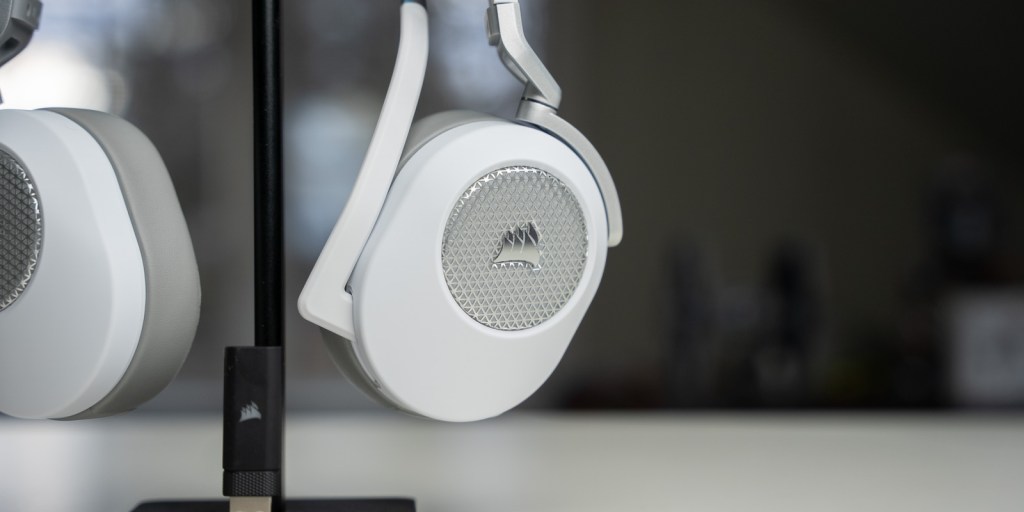
Design overview
At first, the headsets look very similar but there are a few key differences. Both headsets are available in white or black. Looking at the earcups, the HS55 has a yoke design for the headband but the HS65 has a one-sided connection to the earcup.
Both have a large stepped adjustable headband and a flip-to-mute microphone.
Controls are identical between the two variations. On the left earcup are an additional physical mute button, the volume wheel which can also be pressed in for quick EQ changes, and a USB-C port.
Over on the right earcup are a multi-function Bluetooth button and a power button. Pressing the power button will also toggle between 2.4 and Bluetooth audio modes when the headset is connected to both.
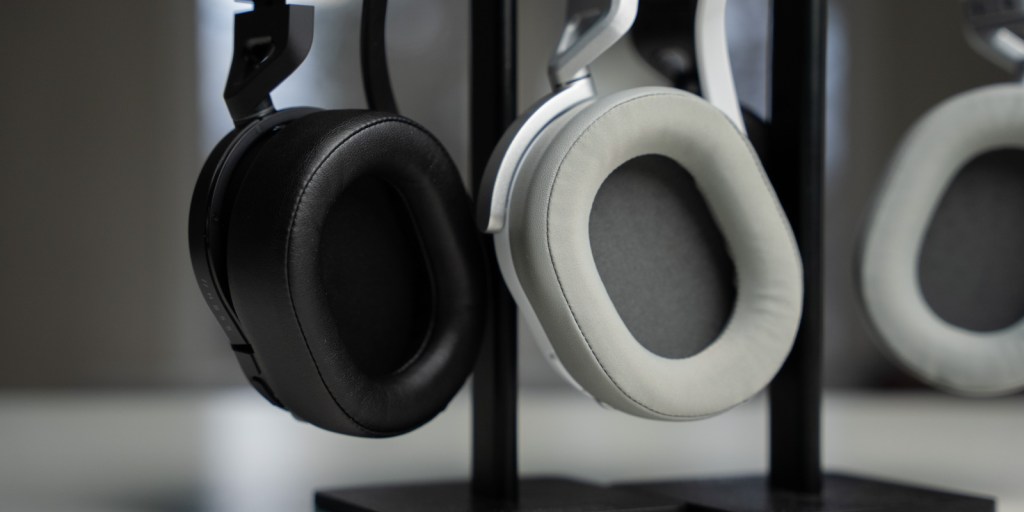
How’s the comfort?
Comfort is going to be subjective for everybody but in my experience, both the HS55 and HS65 were right on the edge of being uncomfortable.
The earcups are large, and it seems like there is plenty of padding, but I believe that the biggest factor for the questionable comfort was a combination of the ear cushions and clamping force. The cushions are plenty thick, but soft. For me, it was very noticeable and ended up being a bit fatiguing over time.
When it comes down to it, comfort is passable but neither was the most comfortable headset that I’ve ever tried. But, for this feature set and price point, it performs about as expected.
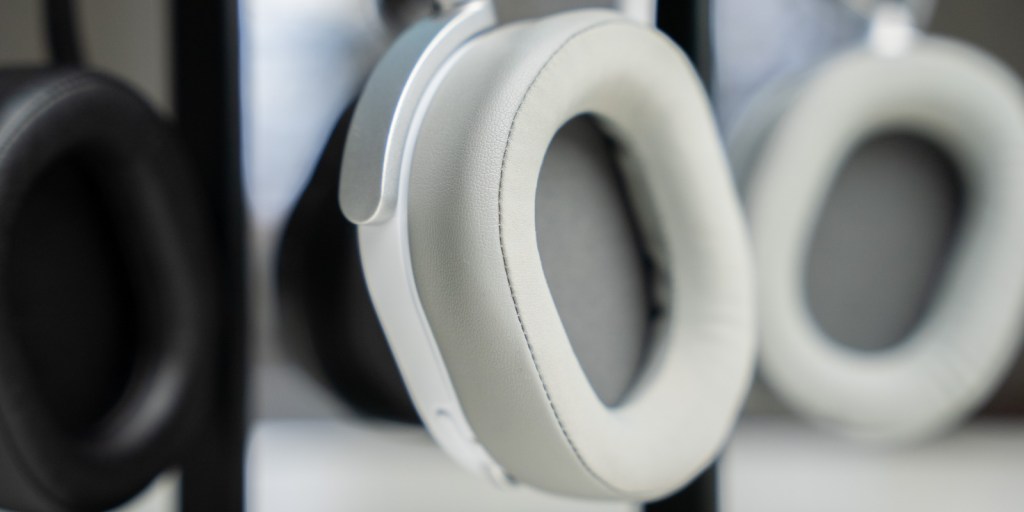
Corsair HS55 and HS65: How do they sound?
Just like comfort is subjective, the sound of a gaming headset is also subjective. Corsair seems to lean into that with the HS55 and HS65. There are deep EQ controls on both headsets to dial in the sound to the user as well as a Dolby Audio mode.
In the default mode, the sound is fairly dark with big, punchy bass. For those who want more, there is also a bass-boost mode that takes things way over the top in my opinion. The movie theater mode was a good starting point for me, but I tweaked that EQ a bit by bringing down the mids and bass a couple of decibels; with those tweaks, I found myself enjoying the sound of these headsets for both gaming and listening to music.
Otherwise, the HS55 and 65 both sound good for the price point. Once again, they don’t compete with more expensive headphones, but imaging and soundstage are all acceptable for the price point and feature set.

Sound ID
Sound ID can be an interesting feature if you’re completely new to any sort of EQ control, but I didn’t prefer the changes this automatic mode made.
One unfortunate feature is that the Sound ID completely takes over an additional EQ control. It would be nice to have a slider-type feature where you could dial in how much of the Sound ID you like, but as it is you either leave it on, turn it off, or run the test again for new results.
iCUE
Corsair’s iCUE app opens up a lot of EQ customization for the HS55 and HS65. There are EQ presets or you can create your own profiles. Personally, I took the Movie Theater preset, copied it, and made a couple of tweaks to get the settings that I currently use.
Inside the app is where you can toggle between Dolby surround and the normal stereo mode as well.
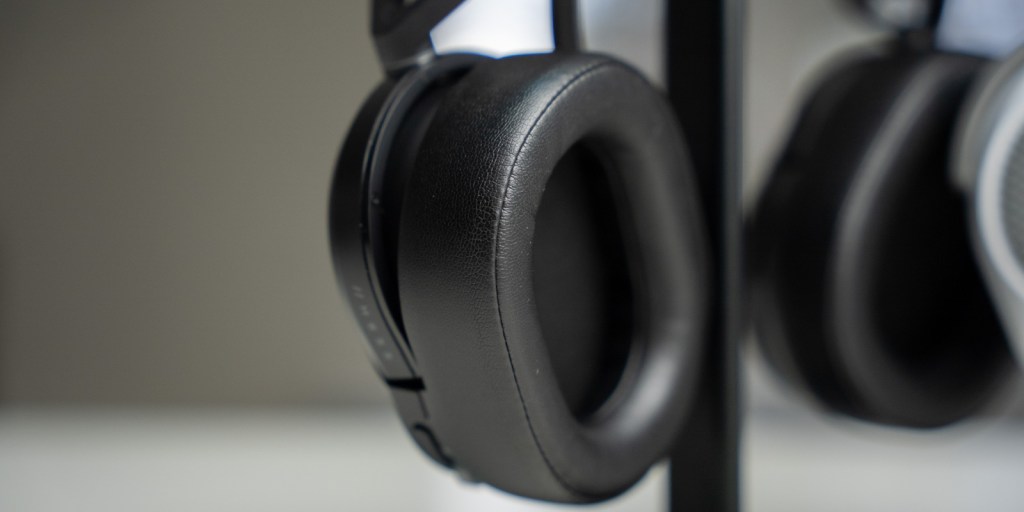
Dolby Audio Surround
As I mentioned in my Virtuoso RGB Wireless XT review, Dolby Atmos is about the only virtual surround sound mode that I’ve found really enhances the gaming experience for me, and that rings true with the HS55 and HS65.
It gives the sound a bit of reverb making it sound like it’s being played in a more spacious environment but that kind of takes out some of the accuracy for me when gaming. It also changes the EQ enough that I don’t care for it while listening to music, either.
The headsets get crazy loud, too. For normal listening, I had them turned down to 2 on my PC. When gaming I would crank it up to 8, but they can get much, much louder than what my ears crave these days.

Corsair HS55 and HS65: Battery life
Battery life is pretty impressive on the HS55 and HS65 as well. Both headsets up to 24 hours on wireless and 37 hours on Bluetooth, which still pales in comparison to the HyperX Cloud Alpha Wireless’s 300 hours, but is fairly commendable nonetheless. Anything that lets you get a few days of use is good enough in my opinion.
Corsair HS65: Mic test
Unfortunately, the microphone is nothing to write home about. Unlike the HS80 which has incredible tone for a wireless gaming headset, the HS55 and HS65 sound thin. Turning on NVIDIA broadcast from the iCUE app didn’t seem to make much of a difference, either. Be sure to hit the video to hear how that sounds.
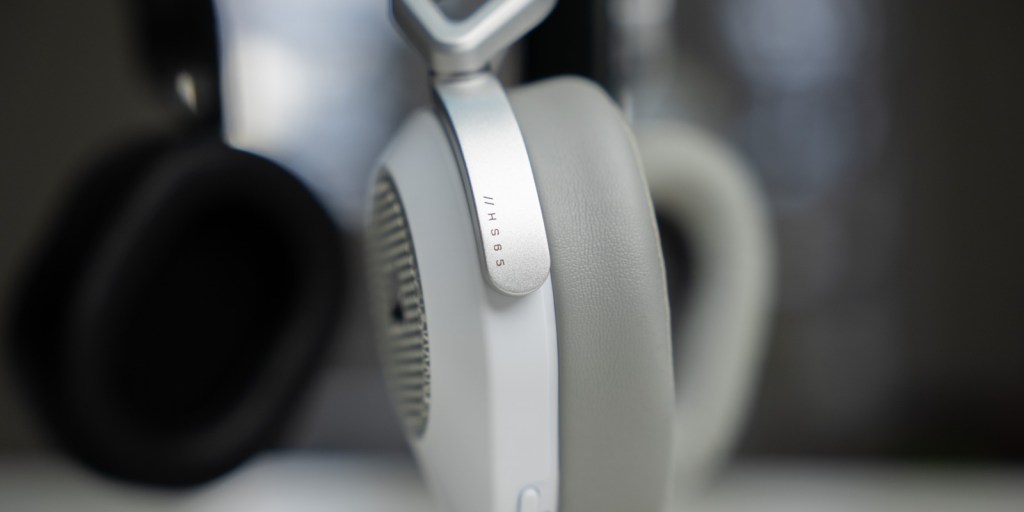
9to5Toys’ Take
Overall, the HS55 and HS65 from Corsair are good budget options if you really need Bluetooth and a 2.4 low-latency connection. Of course, we’d love to see those able to be used at the same time but you’ll have to go for a more expensive pair of headphones for that feature.
I don’t think they really excel in any one category but the lengthy feature list makes them a good choice for those who are tight on a budget.
Buy Corsair Headsets
FTC: We use income earning auto affiliate links. More.




Comments